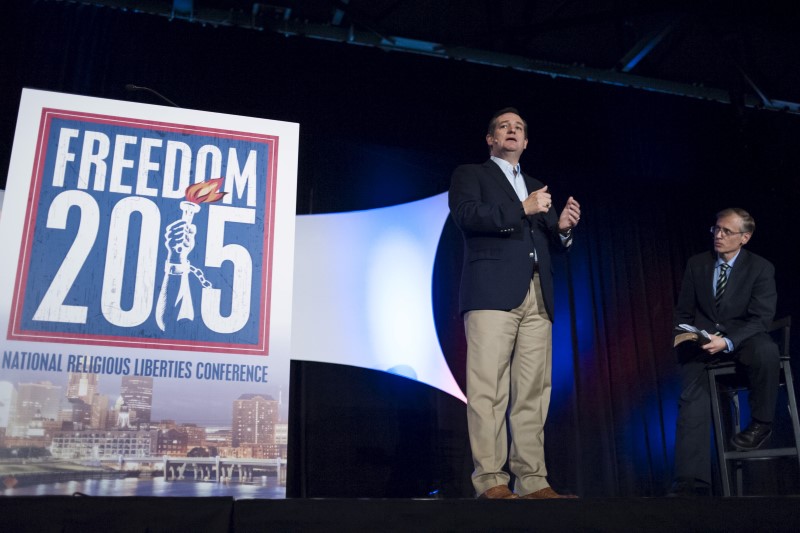By Erin McPike
WASHINGTON (Reuters) - When Ted Cruz launched his 2016 presidential campaign last spring, the U.S. Senator from Texas cast himself as the leader of a conservative grassroots army who could shake up Washington and the Republican political establishment.
Since then, Cruz, who played a leading role in the 2013 shutdown of the federal government, has seen two rivals, Donald Trump and Ben Carson, eclipse him as anti-establishment candidates in the race for the Republican presidential nomination.
While still lagging the front-runners, Cruz has begun to rise in the polls. If Trump and Carson falter, he aims to be the strongest conservative left standing.
If he does well at the Republican debate in Milwaukee on Tuesday, Cruz could join the leaders of the pack, helped by his fundraising skills, digital strategy and extensive field operation in early-voting states like South Carolina.
Steve Schmidt, a top aide on John McCain's 2008 presidential campaign, sees Cruz as one of the strongest candidates in the Republican field, along with Trump and Marco Rubio, the U.S. senator from Florida.
"He lines up ideologically with the Republican Party today more than any other candidate and has the ability to rack up delegates throughout the South," Schmidt said.
Rubio will be under scrutiny at the Milwaukee debate which starts at 9 p.m. EST (0200 GMT Wednesday) as he tries to unseat fellow Floridian Jeb Bush as favorite of the Republican establishment.
Cruz, a conservative Christian who appeals to the right wing of the party, is polling at around 10 percent nationally after gaining momentum in last month's debate when he accused the media of bias against conservatives in the contest for the party's nomination for the November 2016 election.
He is now in fourth place behind Trump, Carson and Rubio in both Reuters/Ipsos and RealClear Politics national polling.
Cruz hopes to court evangelical voters and grassroots conservatives in states like South Carolina where a PPP poll this week put him third at 15 percent. Trump was still first in the early-voting state but lost 12 percentage points since a PPP survey there in September.
Republican strategist Frank Donatelli, a three-decade veteran of presidential politics, said Cruz, like Trump and Carson, can connect with conservative voters who are deeply disenchanted with the status quo.
Donatelli said support for Trump and Carson, both of whom lack political experience, could fade if voters decide their campaign messages amount mostly to generalities.
"Tactically, the Cruz campaign is superior to the other two," Donatelli said.
GROUND GAME
Cruz has more than 77,000 volunteers nationwide and was the first candidate to have county chairs in every county in Iowa, New Hampshire, South Carolina, and Nevada.
In the third quarter of this year, his campaign raked in $12.2 million, the third-highest fundraising tally for the period, behind Carson and Jeb Bush.
Cruz has spent $4.4 million on data so far in the campaign, making him second only to Carson, as he builds up a state-of-the-art nationwide grassroots network to help him get around the Republican establishment.
While Cruz's digital tools have started small, they are allowing his supporters to reach potential donors and voters in hopes of building a more loyal base of support than his rivals have.
A fundraising site called CruzCrowd boasts it is the world's first crowdfunding effort in presidential politics.
Cruz's voter mobilization app, Cruz Crew, encourages users to send messages to potential supporters and provides users with lists of likely Republican voters in their neighborhoods to reach out to. The app has been seen by at least 140,000 people, according to its latest stats.
Larry Sabato, a political scientist at the University of Virginia, said that while Cruz's efforts to build a strong organization could be a big advantage in states such as Iowa, he will need more than that to prevail.
"The candidate must meet the moment," Sabato said. "He's on the board as a possible nominee. He's not a front-runner, but some of the elements are there that he needs to win."
Brian Walsh, a Republican strategist who is not aligned with any of the 2016 contenders, said he believes Cruz has a strong chance of winning the Republican primary but is probably too conservative as a general election candidate.
"He is running the most shrewdly calculating campaign," Walsh said. "His people are very smart. The larger issue is – you could do everything right in a primary, but he is so far to the right, it would be a very big problem in a general election."

For more on the 2016 U.S. presidential race and to learn about the undecided voters who determine elections, visit the Reuters website. (http://www.reuters.com/election2016/the-undecided/)